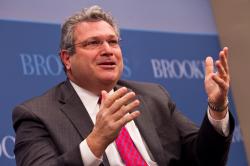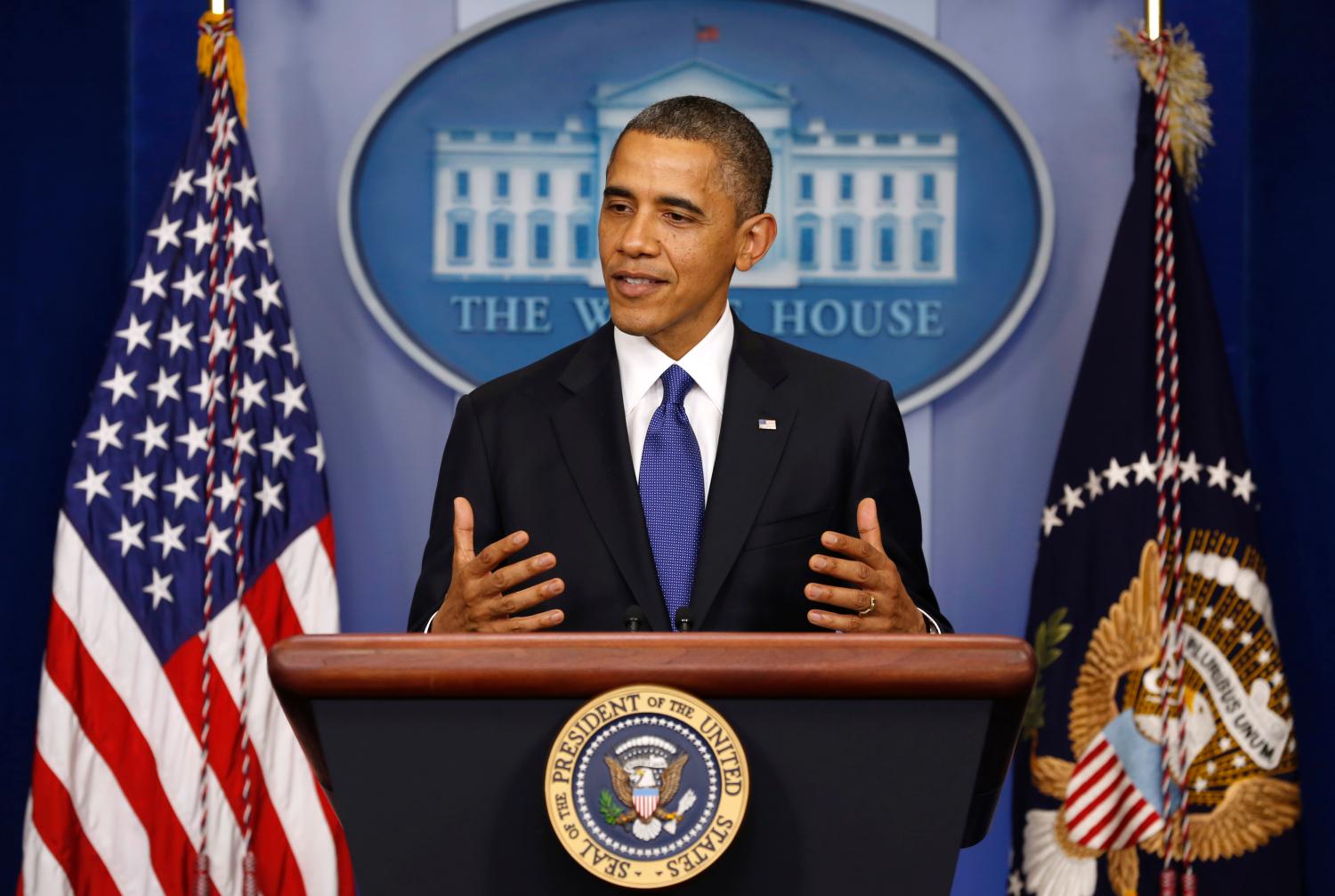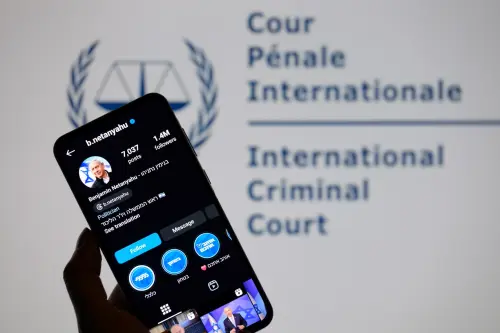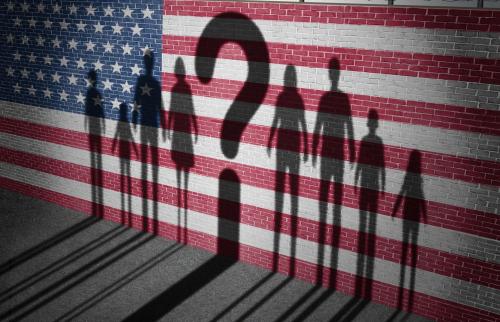In the next four years, President Obama has a choice about whether to make democracy building and a liberal world order key tenets of his foreign policy plan. Martin Indyk and Robert Kagan wrote this memorandum to the President as part of the Big Bets and Black Swans: A Presidential Briefing Book.
- Will America turn inward and away from an increasingly unstable world?
- How can American take advantage of this plastic moment to mold the emerging global order to best serve the United States and humankind?
- Will America launch a new effort to strengthen and extend the liberal world order?
Download Memorandum
(pdf) |
Download the Presidential Briefing Book
(pdf)
Editor’s Note: An adapted version of this Big Bets and Black Swans memo was published in the
New York Times
on January 21, 2013.
TO: President Obama
FROM: Martin S. Indyk and Robert Kagan
As you enter your second term, the state of the world is remarkably unsettled. The leading powers are beset with economic crises or are in various states of political transition or gridlock. The Middle East is in a state of political upheaval. Tensions are rising in East Asia. The world’s institutions, whether the United Nations, the G-20, or the European Union, are weakened and dysfunctional, and seem to be pulling apart in the absence of concerted leadership. The liberal world order established after the Second World War — characterized by a free, open international economy, the spread of liberal democracy, and the deepening of liberal, peaceful norms of international behavior — is fraying at the edges.
It is a time of uncertainty and instability for the world, and for the United States; but it is also a moment of opportunity. Almost a century ago, when the United States entered the First World War, the philosopher John Dewey observed that the world was at a “plastic juncture.” He and many other progressives believed that the unsettled world of their day offered the United States and the other democratic powers a chance to remold the international system into something better. Americans walked away from that challenge and would embrace it only after a second catastrophic breakdown of world order. Today, we are at another “plastic juncture.” Will America turn inward and away from an increasingly messy world? Or will we launch a new effort to strengthen and extend, both geographically and temporally, the liberal world order from which Americans and so many others around the world have benefited?
The answer depends very much on how you choose to make use of your next four years in office. Unfortunately, there is not a lot to show for your first four years. In many respects, this is understandable. The economic crisis that you inherited made steady concentration on foreign policy more challenging. The two wars you inherited in the Greater Middle East had been bungled by your predecessor and cost the United States dearly, both materially and in terms of reputation. You began to restore that reputation through your own global appeal and the efforts of your Secretary of State.
You have done especially well in raising America’s profile and deepening our engagement in East Asia. However, so far it is hard to list many durable accomplishments. Most of the major challenges are much as you found them when you took office, or worse: from the stalled Middle East peace process and turmoil in the Arab world to Iran’s continuing march toward a nuclear weapons capability to China’s increasing assertiveness in East Asia. Your understandable preoccupation with reelection has left much of the world wondering: Where is the United States?
For all the talk of American decline from certain quarters, the United States is actually well-positioned for a new era of global leadership. If you can strike the difficult but necessary compromise with Congress that begins to address America’s fiscal crisis, the United States could well emerge as among the world’s most successful and dynamic economies. America enjoys unique advantages in the international economic system: a natural gas revolution that promises soon to make it a net-exporter of energy, a superior university education system and an open and innovative economy that continues to attract the world’s best and most creative young minds. On the international stage, the United States remains the only world power with global reach, uniquely capable of organizing concerted international action and serving as a source of security and stability to nations and peoples facing threatening neighbors.
Recommendations:
How then to take advantage of this plastic moment to mold the changing global order to best serve the United States and humankind? We believe that in the next four years you will have a unique opportunity to shape a multilateral global order that will continue to reflect American liberal values and progressive ideals. This will require your sustained attention, personal engagement, and direction of the national security agencies of the U.S. government. The reward could be a transformational and lasting impact on the international system, which will redound to the benefit of future generations.
In the security realm, your primary “big bet” must be to prevent Iran from obtaining a nuclear weapons capability. It is hard to imagine a bigger blow to the international security order than the collapse of the nonproliferation regime that would follow Iran’s successful acquisition of nuclear weapons. Conversely, if you can succeed in achieving meaningful curbs on Iran’s nuclear weapons aspirations and reinforce this by negotiating another nuclear arms reduction agreement with Moscow, you will do much to strengthen non-proliferation and nuclear disarmament as a fundamental pillar of the new liberal global order.
In East Asia, your primary big bet should be on promoting a regional order that encourages China to develop in a peaceful and productive direction. You have already formulated a credible strategy; now you will need to encourage China’s new leadership away from greater reliance on military power in favor of continued economic and political development at home and increasing economic and political integration abroad. This will mean continuing to deepen America’s Asian alliances, especially with the new leaderships in Tokyo and Seoul; building new partnerships with the nations of the region; and playing a major role in supporting regional cooperation. You should ensure that the rebalancing effort in East Asia goes beyond the military to include all aspects of American power. With India, the world’s largest democracy and the other major rising power in Asia, you have laid a strong foundation but the next four years will be critical in building a partnership that can serve as another pillar of the emerging liberal geopolitical order.
Strengthening the liberal economic order needs to be a higher priority in your second term. Concluding free trade agreements with the Asia- Pacific region and Europe would boost U.S. exports and global economic recovery while promoting a broader consensus on the necessary standards to promote free trade and investment in the global economy. Building the infrastructure and putting in place the policies necessary to export American natural gas to key allies and partners, especially in Europe and Asia, will help reduce their dependence on Russia and Iran. Leveraging America’s hydrocarbon bonanza to encourage more effective efforts to counter climate change can help promote a greener global order.
Strengthening the liberal political order will require increased efforts to enlist the support of emerging democracies. Nations like Brazil, Indonesia, Mexico, South Africa and Turkey have become increasingly influential economically. But they are struggling to find their identity as democratic powers on the international stage and, in some cases, are punching below their weight. Some are drifting toward a worldview that actually undermines the liberal nature of the global order. At the same time, powerful autocracies like Russia have staked out positions at the United Nations and elsewhere that are antithetical to liberal values — on the issue of Syria, for instance. These autocratic powers need to understand that if they continue their obstructionism, the democratic international community will increasingly move on without them and they will be isolated.
In your first term, you were reluctant to make democracy a centerpiece of your foreign policy. However, with revolutions in the Arab world and political changes in Burma that you have supported, it is time to place the United States once again at the vanguard of the global democracy movement. This is not only because democracy is consonant with American values. In the Middle East, in Russia and parts of Eastern Europe, just as in Burma and the rest of Asia, the United States has strategic, political and economic interests in the spread of stable, liberal democracies. Although democracies can be fractious, and in times of transition unstable, in the end they are more reliable supporters of the liberal world order which Americans seek. The United States needs to do more in support of the difficult struggle for democracy in the Arab world too, including holding the Egyptian Muslim Brotherhood government to democratic standards, and more actively leading the effort to shape a positive democratic outcome in Syria and preventing it from descending into chaos or becoming a haven for jihadists and Iranian proxies. America’s relationship with Russia needs to be shaped by strategic arms agreements as well as by respect for the desires and aspirations of the Russian people. You should work to steer Russia in a positive direction, strengthening where you can those forces in Russian society that favor economic and political modernization.
Finally, the United States needs a global strategy. It cannot focus on one critical region to the detriment of others. While you were absolutely right to increase American attention to the vital region of the Asia-Pacific, the United States cannot and should not reduce its involvement in the Middle East or in Europe. Since the end of the Second World War, the United States has played the key security role in all three regions at once; there is no safe alternative to that. This is particularly true in the Middle East, where many nations look to the United States for both protection and assistance. But even Europe deserves continued American attention and involvement. Everything the United States wants to accomplish in the world can be better accomplished with the help and cooperation of its European allies.
Conclusion:
At the end of World War II, the United States led the way in shaping an international political, economic, and security order which, for all its flaws, served the American people, and much of the world, remarkably well. Much is changing in today’s world, but the basic requirements of American foreign policy have not. Your great challenge is to seize this plastic moment and apply your leadership to the preservation and extension of the liberal global order for future generations.
The Brookings Institution is committed to quality, independence, and impact.
We are supported by a diverse array of funders. In line with our values and policies, each Brookings publication represents the sole views of its author(s).




